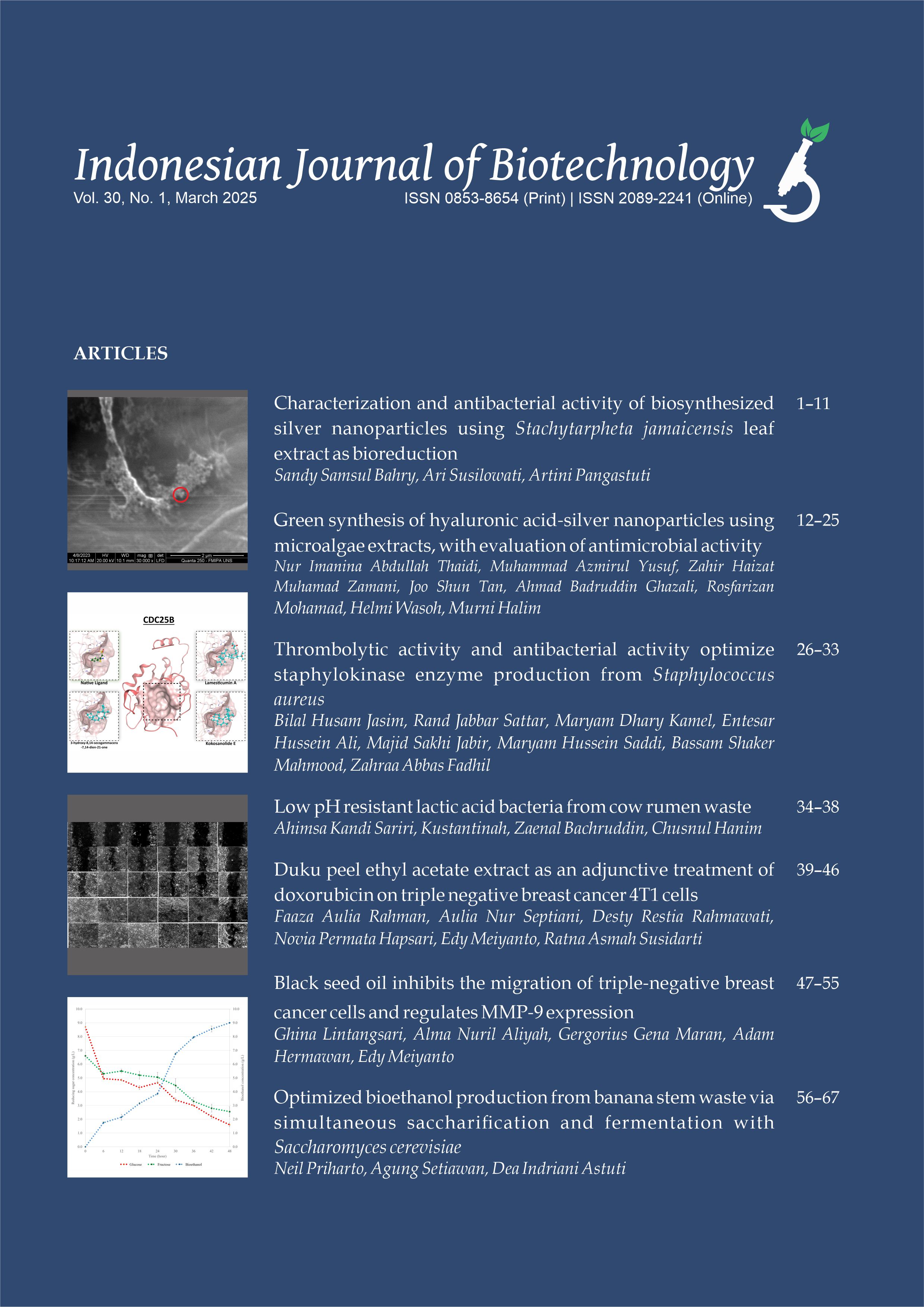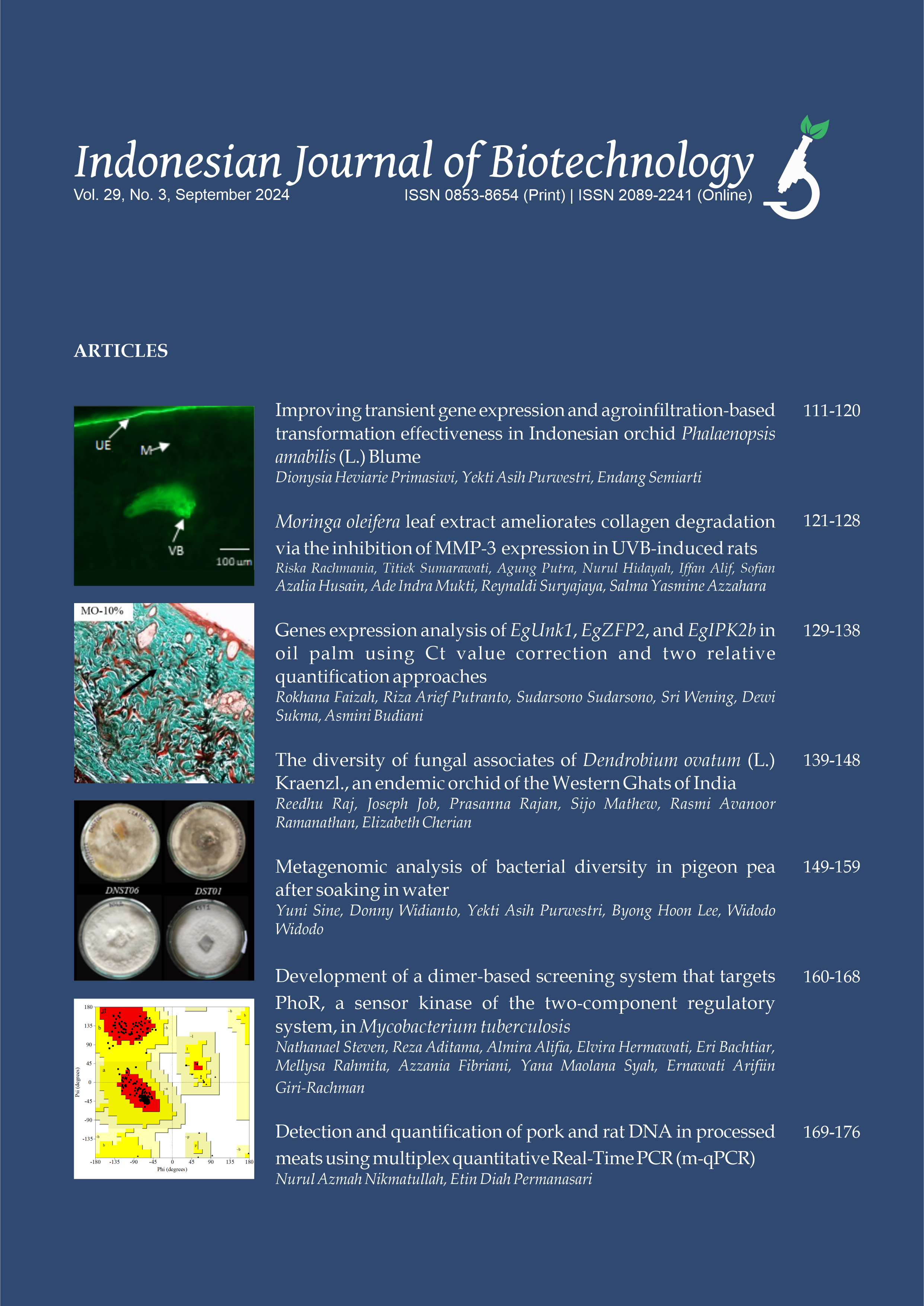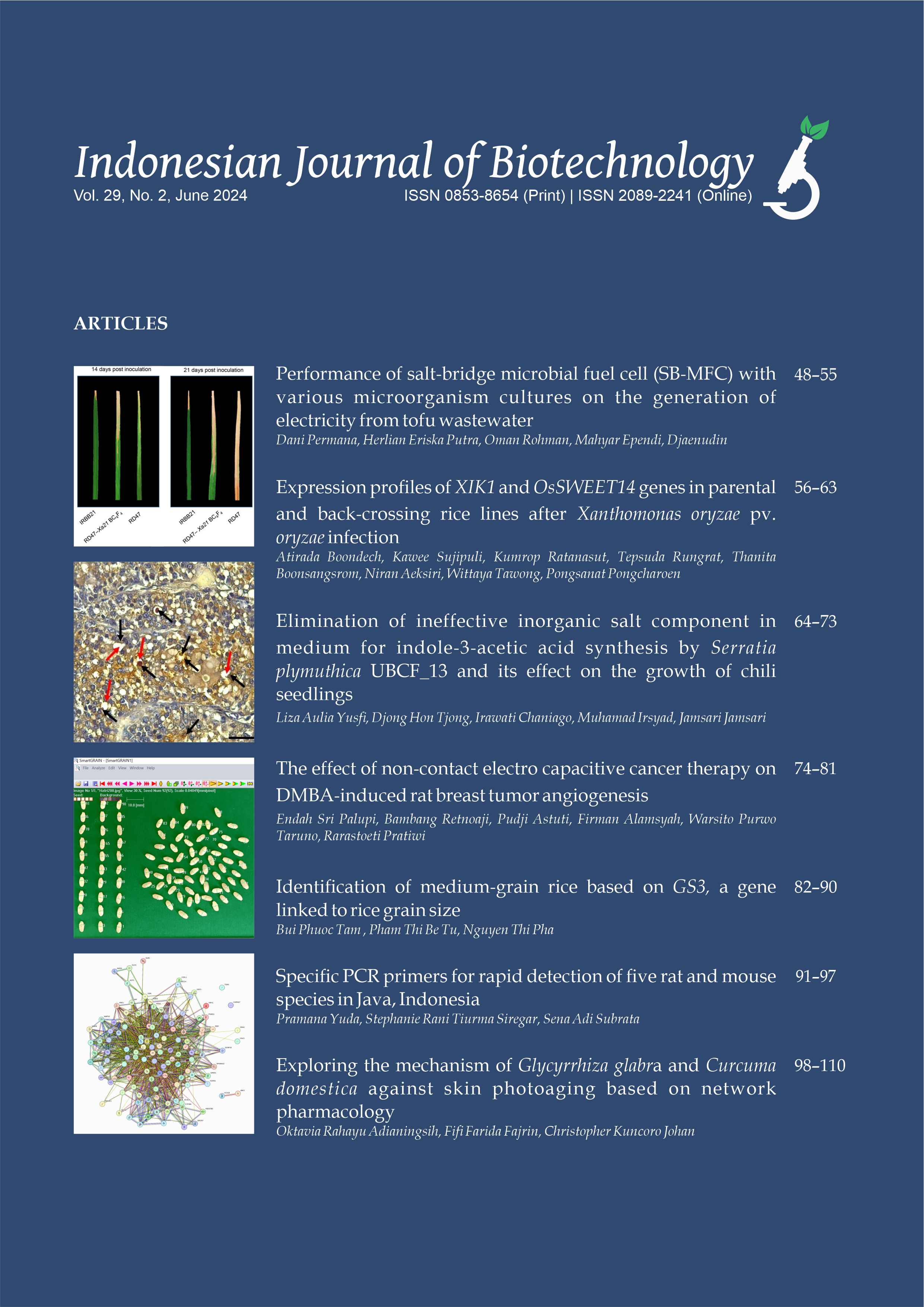Application of CRISPR/Cas9 genome editing system for molecular breeding of orchids
Endang Semiarti(1*), Sri Nopitasari(2), Yuli Setiawati(3), Muhammad Dylan Lawrie(4), Aziz Purwantoro(5), Jaka Widada(6), Yasushi Yoshioka(7), Shogo Matsumoto(8), Kana Ninomiya(9), Yuuki Asano(10)
(1) Universitas Gadjah Mada
(2) Universitas Gadjah Mada
(3) Universitas Gadjah Mada
(4) Universitas Gadjah Mada
(5) Universitas Gadjah Mada
(6) Universitas Gadjah Mada
(7) Nagoya University, Japan
(8) Nagoya University, Japan
(9) Nagoya University, Japan
(10) Nagoya University, Japan
(*) Corresponding Author
Abstract
Orchid is an important ornamental plant in Indonesia due to their natural beauty of flowers. In the tropical forest, orchids are being acquired for trading and commercial market. Thus, the effort is required to proliferate orchid in large quantities for conservation and improve the floral variation for plant breeding. The purpose of this study is to develop a firmed methodology of molecular breeding of orchids using CRISPR/Cas9 KO system. The plant material used was Phalaenopsis amabilis protocorms growth on NP medium+pepton (2 g/L). Protocorm were submerged in the culture of Agrobacterium tumefaciens that Ti‐plasmid had been filled with a T‐DNA construct of a pRGEB32 vector harboring sgRNA with PDS3 sequence. Detection for transformants was confirmed by PCR using HPT primers (545 bp), Cas9 primers (402 bp), PDS primers (280 bp) and trnL‐F (1200 bp) as an internal control. The results showed that 0.96% PDS transformants were obtained from PDS3T2 lines. Several transformant showed pale leaf color compared to non‐transformant plants. This study suggests that the target gene has successfully edited by CRISPR/Cas9 system and could be applied for that functional gene editing in orchids.
Keywords
Full Text:
PDFReferences
Bhattacharya D, Van Meir EG. 2019. A simple genotyping method to detect small CRISPRCas9 induced indels by agarose gel electrophoresis. Sci Rep. 9(4437). doi:10.1038/s41598019399504.
Cai J, Liu X, Vanneste K, Proost S, Tsai WC, Liu KW, Chen LJ, He Y, Xu Q, Bian C, et al. 2015. The genome sequence of the orchid Phalaenopsis equestris. Nat Genet. 47(1):65–72. doi:10.1038/ng.3149.
Chen J, Wang L, Chen J, Huang J, Liu F, Guo R, Yang L, Grabon A, Zhao K, Kong F, Others. 2018. Agrobacterium tumefaciens-mediated transformation system for the important medicinal plant Dendrobium catenatum Lindl. In Vitro Cell Dev Biol Plant. 54(3):228– 239. doi:10.1007/s1162701899034.
Chiruvella KK, Liang Z, Wilson TE. 2013. Repair of DoubleStrand Breaks by End Joining. Cold Spring Harbor Perspect Biol. 5(5):a012757. doi:10.1101/cshperspect.a012757.
Guo M, Ye J, Gao D, Xu N, Yang J. 2019. Agrobacterium-mediated horizontal gene transfer: Mechanism, biotechnological application, potential risk and forestalling strategy. Biotechnol Adv. 37(1):259–270. doi:10.1016/j.biotechadv.2018.12.008.
Hahn F, Eisenhut M, Mantegazza O, Weber APM. 2018. HomologyDirected Repair of a Defective Glabrous Gene in Arabidopsis With Cas9Based Gene Targeting . doi:10.3389/fpls.2018.00424.
Hsu PD, Lander ES, Zhang F. 2014. Development and Applications of CRISPRCas9 for Genome Engineering. Cell. 157(6):1262–1278. doi:10.1016/j.cell.2014.05.010.
Koschmieder J, FehlingKaschek M, Schaub P, Ghisla S, Brausemann A, Timmer J, Beyer P. 2017. Planttype phytoene desaturase: Functional evaluation of structural implications. PLoS ONE. 12(11):e0187628. doi:10.1371/journal.pone.0187628.
Krenek P, Samajova O, Luptovciak I, Doskocilova A, Komis G, Samaj J. 2015. Transient plant transformation mediated by Agrobacterium tumefaciens: Principles, methods and applications. Biotechnol Adv. 33(6, Part 2):1024–1042. doi:10.1016/j.biotechadv.2015.03.012.
Kui L, Chen H, Zhang W, He S, Xiong Z, Zhang Y, Yan L, Zhong C, He F, Chen J, et al. 2017. Building a Genetic Manipulation Tool Box for Orchid Biology: Identification of Constitutive Promoters and Application of CRISPR/Cas9 in the Orchid, Dendrobium officinale. Front Plant Sci. 7:2036. doi:10.3389/fpls.2016.02036.
Liu X, Wu S, Xu J, Sui C, Wei J. 2017. Application of CRISPR/Cas9 in plant biology. Acta Pharm Sin B. 7(3):292–302. doi:10.1016/j.apsb.2017.01.002.
Ma X, Zhang Q, Zhu Q, Liu W, Chen Y, Qiu R, Wang B, Yang Z, Li H, Lin Y, et al. 2015. A Robust CRISPR/Cas9 System for Convenient, HighEfficiency Multiplex Genome Editing in Monocot and Dicot Plants. Mol Plant. 8(8):1274–1284. doi:10.1016/j.molp.2015.04.007.
Men S, Ming X, Liu R, Wei C, Li Y. 2003. Agrobacterium-mediated genetic transformation of a Dendrobium orchid. Plant Cell, Tissue Organ Cult. 75(1):63–71. doi:10.1023/A:1024627917470.
MingeotLeclercq MP, Glupczynski Y, Tulkens PM. 1999. Aminoglycosides: activity and resistance. Antimicrob Agents Chemother. 43(4):727–737.
Naing AH, Kyu SY, Pe PPW, Park KI, Lee JM, Lim KB, Kim CK. 2019. Silencing of the phytoene desaturase (PDS) gene affects the expression of fruitripening genes in tomatoes. Plant Methods 15(1):110. doi:10.1186/s130070190491z.
Qin G, Gu H, Ma L, Peng Y, Deng XW, Chen Z, Qu LJ. 2007. Disruption of phytoene desaturase gene results in albino and dwarf phenotypes in Arabidopsis by impairing chlorophyll, carotenoid, and gibberellin biosynthesis. Cell Res. 17(5):471–482. doi:10.1038/cr.2007.40.
Semiarti E, Indrianto A, Purwantoro A, Isminingsih S, Suseno N, Ishikawa T, Yoshioka Y, Machida Y, Machida C. 2007. Agrobacterium-mediated transformation of the wild orchid species Phalaenopsis amabilis. Plant Biotechnol. 24(3):265–272. doi:10.5511/plantbiotechnology.24.265.
Semiarti E, Indrianto A, Purwantoro A, Machida Y, Machida C. 2011. Agrobacterium-Mediated Transformation of Indonesian Orchids for Micropropagation. In: M Alvarez, editor, Genetic Transformation. Rijeka: IntechOpen. p. Ch. 11. doi:10.5772/24997.
Semiarti E, Indrianto A, Purwantoro YH, Martiwi INA, Feroniasanti YML, Nadifah F, Mercuriana IS, Dwiyani R, Iwakawa H, Yoshioka Y, et al. 2010. Highfrequency genetic transformation of Phalaenopsis amabilis orchid using tomato extract enriched medium for the preculture of protocorms. J Hortic Sci Biotechnol. 85(3):205–210. doi:10.1080/14620316.2010.11512655.
Setiari N, Purwantoro A, Moeljopawiro S, Semiarti E. 2018. Micropropagation of Dendrobium phalaenopsis Orchid Through Overexpression of Embryo Gene AtRKD4. AGRIVITA, Journal of Agricultural Science 40(2):284–294. doi:10.17503/agrivita.v40i2.1690.
Shan Q, Wang Y, Li J, Zhang Y, Chen K, Liang Z, Zhang K, Liu J, Xi JJ, Qiu JL, Gao C. 2013. Targeted genome modification of crop plants using a CRISPRCas system. Nat Biotechnol. 31(8):686– 688. doi:10.1038/nbt.2650.
Shen H, Strunks GD, Klemann BJPM, Hooykaas PJJ, de Pater S. 2017. CRISPR/Cas9Induced DoubleStrand Break Repair in Arabidopsis Nonhomologous EndJoining Mutants. G3: Genes, Genomes, Genet. 7(1):193–202. doi:10.1534/g3.116.035204.
Tie W, Zhou F, Wang L, Xie W, Chen H, Li X, Lin Y. 2012. Reasons for lower transformation efficiency in indica rice using Agrobacterium tumefaciens-mediated transformation: lessons from transformation assays and genomewide expression profiling. Plant molecular biology 78(12):1–18. doi:10.1007/s1110301198425.
Tong CG, Wu FH, Yuan YH, Chen YR, Lin CS. 2019. Highefficiency CRISPR/Casbased editing of Phalaenopsis orchid MADS genes. Plant Biotechnol J. 18(4):889–891. doi:10.1111/pbi.13264.
Tsutsui H, Higashiyama T. 2016. pKAMAITACHI Vectors for Highly Efficient CRISPR/Cas9Mediated Gene Knockout in Arabidopsis thaliana. Plant Cell Physiol. 58(1):46–56. doi:10.1093/pcp/pcw191.
Utami ESW, Hariyanto S, Manuhara YSW. 2018. Agrobacterium tumefaciens-mediated transformation of Dendrobium lasianthera JJ Sm: An important medicinal orchid. J Genet Eng Biotechnol. 16(2):703–709. doi:10.1016/j.jgeb.2018.02.002.
Wang M, Wang G, Ji J, Wang J. 2009. The effect of pds gene silencing on chloroplast pigment composition, thylakoid membrane structure and photosynthesis efficiency in tobacco plants. Plant Sci. 177(3):222–226. doi:10.1016/j.plantsci.2009.04.006.
Xie K, Minkenberg B, Yang Y. 2015. Boosting CRISPR/Cas9 multiplex editing capability with the endogenous tRNAprocessing system. Proc Natl Acad Sci. 112(11):3570–3575. doi:10.1073/pnas.1420294112.
Article Metrics
Refbacks
- There are currently no refbacks.
Copyright (c) 2020 The Author(s)

This work is licensed under a Creative Commons Attribution-ShareAlike 4.0 International License.









